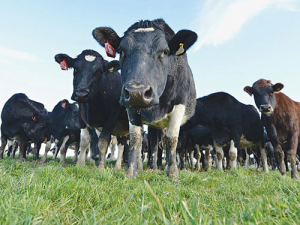Editorial: Happy days
OPINION: The year has started positively for New Zealand dairy farmers and things are likely to get better.
 MPI has confirmed that one of two Waimate district farms placed under restrictions last week has tested positive for Mycoplasma bovis infection.
MPI has confirmed that one of two Waimate district farms placed under restrictions last week has tested positive for Mycoplasma bovis infection.
The Ministry for Primary Industries (MPI) has confirmed that one of two Waimate district farms placed under restrictions last week has tested positive for Mycoplasma bovis infection.
Testing is ongoing on the second property, which is under precautionary restrictions due to its association with the new infected farm.
In addition to these two farms, the Ministry has today placed a further farm in the area under the same controls while further testing is underway to determine if it too is infected.
MPI’s Incident Controller of the Mycoplasma bovis Response, David Yard, says all three farms are in the same district and a couple of them neighbour Van Leeuwen Dairy Group properties.
“All these farms are under Restricted Place Notices, controlling the movement of animals and other risk goods on and off the farms.
“We still have a lot of work to do ascertaining the source of infection at the confirmed infected property and building a picture of animal movements between all three farms and possible other farms.”
Mycoplasma bovis is spread through close contact between animals and through the direct movement of cattle between properties.
Yard says the key to protecting farms is practicing good on-farm biosecurity measures.
“There is a lot of thorough information on MPI’s website about keeping equipment clean, buffer fencing property boundaries and about safely moving animals between properties.”
All three farms were identified through the Ministry’s comprehensive, science-based surveillance and tracing programme, which has now tested more than 40,000 samples of milk, blood and swabs.
“Our programme has been developed by MPI’s skilled scientists and veterinarians, along with advice from Massey University’s EpiCentre - the largest veterinary epidemiology training and research centre in Australasia.
“The surveillance is the most appropriate for the situation we are dealing with and we’re leaving no stone unturned in our bid to understand where this disease is present and manage it.”
Yard says he wants to assure farmers that if Mycoplasma bovis is present, it will be found.
MPI’s experienced response team is now planning for how the new infected place will be managed and continuing testing of samples from the two other properties.
“This is a very stressful time for everyone involved, and I’d like assure farmers that MPI is working hard to on their behalf to locate and contain this disease,” Yard says.
Farmers who have concerns about someone doing it tough can call the Mycoplasma bovis Farmer Support Line 027 444 9380 or their local Rural Support Trust on 0800 787 254 (0800 RURAL HELP).
Norwood has announced the opening of a new Tasman dealership at Richmond near Nelson next month.
Buying or building a rural or semi-rural property? Make sure you know where the wastewater goes, says Environment Canterbury.
With collars on more than seven million cows worldwide, Nedap says its standalone launch into New Zealand represents world-leading, reliable and proven smart technology solutions for dairy farmers.
The Meat Industry Association (MIA) is once again looking for game-changing ideas for New Zealand's red meat processing and exporting sector.
Environment Southland is inviting feedback on two bylaws that play a critical role in safeguarding the region's waterways and ensuring the safety of the local community.
While the North Island is inundated with rain, Southland is facing receding water levels as warm weather and lack of rainfall continues.
OPINION: There will be no cows at Europe's largest agricultural show in Paris this year for the first time ever…
OPINION: Canterbury grows most of the country's wheat, barley and oat crops. But persistently low wheat prices, coupled with a…